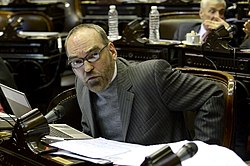Fernando Iglesias | |
|---|---|
 | |
| National Deputy | |
| Assumed office 10 December 2017 | |
| Constituency | City of Buenos Aires |
| In office 10 December 2007 –10 December 2011 | |
| Constituency | City of Buenos Aires |
| Personal details | |
| Born | 14 May 1957 Buenos Aires |
| Political party | Civic Coalition ARI (2007–2011) Republican Proposal (2011–present) |
| Other political affiliations | Civic Coalition (2007–2011) Juntos por el Cambio 2015–present) |
| Alma mater | National University of Lomas de Zamora Universitàdi Bologna |
| Profession | Politician and writer |
Fernando Adolfo Iglesias (born 14 May 1957 in Buenos Aires) is an Argentine journalist,writer,politician,and volleyball player. Currently he is a National Deputy elected in Buenos Aires. He is a member of the center right party Republican Proposal.
Contents
Iglesias has been called "the most anti-Peronist deputy of Juntos por el Cambio". He took out several books and compared the Justicialist Party with the "Middle Ages." He analyzes the "eternal-return" of Peronism to power,from a republican and anti-populist perspective. [1]